When you’re pregnant, you need to stay a whole heck of a lot healthier.
Your body needs far more nutrients, vitamins, minerals, and even calories than normal. But you may find it challenging or even overwhelming to maintain yourself and your baby without going a little off course in your overall nutrition.
So stay away from poor eating habits and unhealthy foods. Try to keep your body and your growing baby as healthy as possible.
To do that, read this list of the 8 most important nutrition tips you should follow while you’re pregnant.
1. Get More Fiber
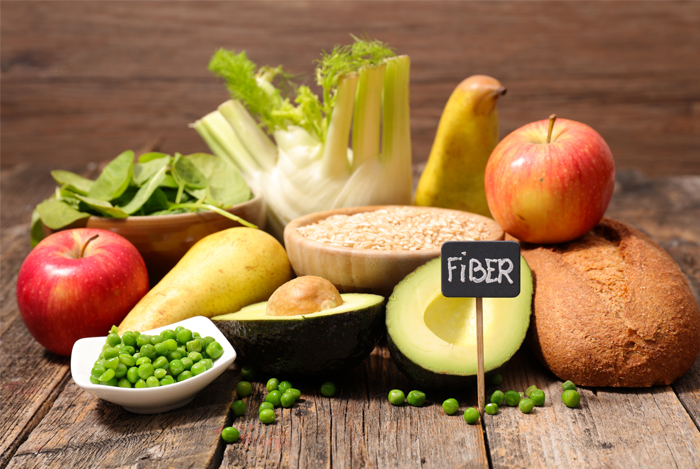
When you’re pregnant, you need a diet high in fruits, vegetables, and whole grains to help you prevent constipation, hemorrhoids, and to keep you feeling full.
Sufficient intake of fiber in the first trimester reduces neural-tube defects like spina bifida by 50 to 70 percent, so you should increase the amount you take to 600 micrograms a day when you know you’re pregnant.
High-fiber foods like these are packed with the vitamins and minerals that are essential to your body and your baby’s development. Try to get 25 to 35 milligrams of fiber each day – about twice the average amount.
2. Stock Up on Calcium
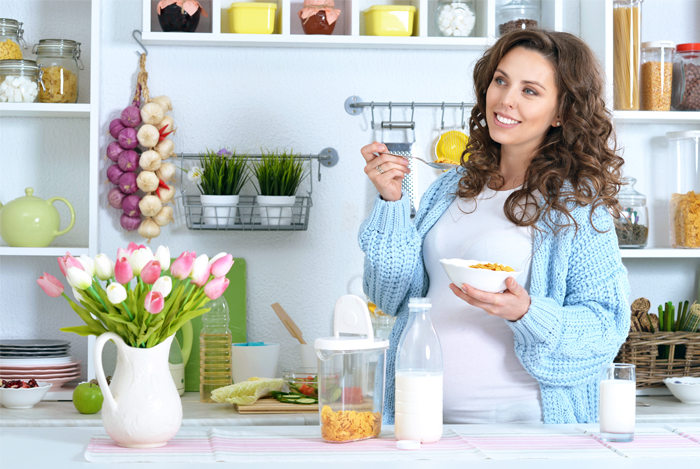
Most people know that calcium helps build strong bones – but did you know it’s crucial to your baby’s skeletal development?
Calcium also helps to prevent pregnancy-induced high blood pressure and aids the normal functions of nerves and muscles.
You want to consume at least 1,000 milligrams of calcium a day, so try to fit as much calcium-rich food into every meal as possible. Drink 3 or more glasses of low-fat or nonfat milk or fortified soymilk, and look for foods that are clearly labeled as being fortified with calcium.
3. Take a Multivitamin

If you are pregnant or may become pregnant, you should take 400 micrograms of folic acid from a multivitamin in addition to the folate you get from foods.
The folic acid supplied by multivitamins is very important during your pregnancy, but the pills provide a much more powerful punch than just that.
Researchers at the University of Pittsburgh found that women in early pregnancy who took a multivitamin or prenatal vitamin regularly reduced their risk of preeclampsia by 45 percent. Preeclampsia is a leading cause of premature delivery and fetal death.
If you do decide to take a multivitamin, be sure you choose one designed specifically for pregnancy. The nutrient levels in the pills will be better for your needs.
4. Get Adequate Iron
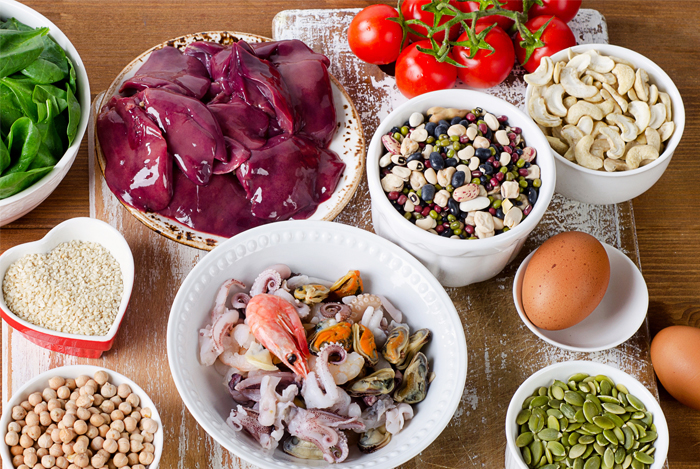
Your body needs nearly double the recommended daily allowance (RDA) of iron when you’re pregnant. That’s about 30 milligrams of iron per day to support your massive increase in blood volume and fetal iron storage.
Because iron transports oxygen, your baby needs as much as it can get in its blood to develop properly. This mineral is difficult to get enough of during your pregnancy, but it’s critical for normal development and growth, and for preventing premature delivery.
So, when you’re pregnant, try to include several iron-rich foods in your diet every day.
5. Eat These Foods
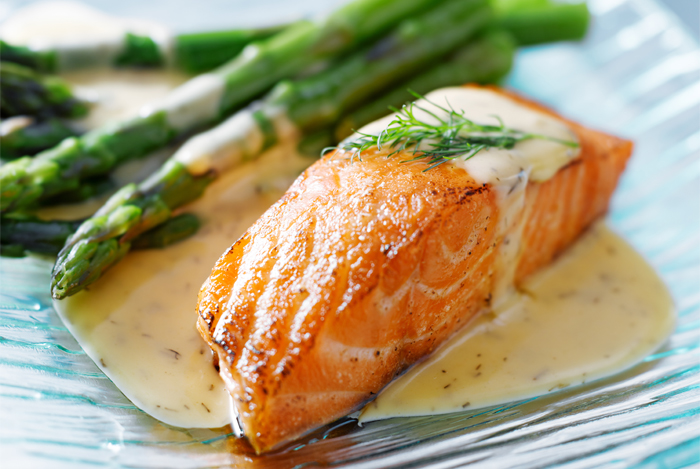
- Low-Fat Dairy – You need extra protein and calcium when you’re pregnant, and low-fat dairy contains both casein and whey. It’s also the best dietary source of calcium available. Greek yogurt is particularly beneficial for pregnant women.
- Legumes – Lentils, peas, beans, chickpeas, soybeans, and peanuts are excellent plant-based sources of fiber, protein, iron, folate, and calcium. In fact, one cup of lentils, chickpeas, or black beans can provide up to 90 percent of your RDA for folate.
- Sweet Potatoes – Rich in beta-carotene, sweet potatoes can reduce blood sugar spikes and improve your digestive health and mobility.
- Salmon – Salmon is packed with essential omega-3 fatty acids, which pregnant women need in high amounts. Studies show that pregnant women who eat 2 to 3 meals of fatty fish per week achieve their recommended intake of omega-3.
- Eggs – Eggs contain 77 calories, along with high-quality protein and fat. They also contain tons of vitamins and minerals that are important for both the mother and child. Choline, found in eggs, is essential for brain development and health; a single egg contains roughly 113 milligrams of choline, about 25 percent the RDA for pregnant women.
- Leafy Greens – Broccoli, kale, spinach, and other dark leafy green vegetables contain fiber, vitamin C, vitamin K, vitamin A, calcium, iron, folate, and potassium. They’re also rich in antioxidants, have a high fiber content, and have been linked with a reduced risk of low birth weight.
- Lean Meat – Beef, pork, and chicken are rich in protein, iron, choline, and the B-complex vitamins, which are essential during pregnancy. Women eating red meat regularly in particular can meet their RDAs for each of these nutrients.
- Fish Liver Oil – Rich in omega-3 fatty acids, fish liver oil also contains high amounts of vitamin D and vitamin A. Low vitamin D intake has been linked with an increased risk of preeclampsia.
- Berries – Berries are full of water, healthy carbs, fiber, vitamin C, and rich plant compounds. Because they have such a low glycemic index value, there’s a low chance of berries causing major spikes in blood sugar – but they’re still a delicious and nutritious snack.
- Whole Grains – During the second and third trimesters, you need a significant increase in calories – so you should get them from whole grains. Unlike refined grains, whole grains have tons of vitamins and fiber, and even protein. They’re also rich in B-vitamins and magnesium, which pregnant women often lack in their diets.
6. Avoid These Foods

- Raw Meat and Fish – When you eat these foods raw, you increase your risk of infection from bacteria and parasites. These bacteria can lead to stillbirth, severe neurological illnesses, blindness, and epilepsy.
- Raw Eggs – If a pregnant mother gets a Salmonella infection, it could cause cramps in the uterus and lead to premature or stillbirth. Many commercial products that contain raw eggs are safe to consume, but pregnant women should always read the label, and cook eggs thoroughly whenever possible.
- Caffeine – For a long time, 300 milligrams of caffeine (the equivalent of two cups of coffee) has been considered acceptable during pregnancy. But recent studies have found that consuming just 200 milligrams of caffeine a day increased the risk of miscarriage.
- Unwashed Produce – Toxoplasma, E.coli, Salmonella, and Listeria can be acquired from the soil or through handling, and will remain on unwashed or unpeeled fruits. Because bacteria is so harmful to both the mother and the unborn baby, pregnant mothers should be very careful when selecting and preparing produce.
- Unpasteurized Dairy and Juice – These products can contain harmful bacteria like Listeria, Salmonella, and E. coli, which can have life-threatening consequences for an unborn baby. Pasteurization is the safest and most effective way to kill off harmful bacteria, so always consume pasteurized products.
- Alcohol — Virtually no amount of alcohol has been shown to be safe, so avoid it at all costs. If you drink during your pregnancy, your child could have a range of behavioral problems, learning disabilities, attention deficit disorder, hyperactivity, and aggressive behavior.
- Processed Junk Food – Sure, you’re eating for two now, but that doesn’t mean you need twice the calories. Processed junk food is much higher in calories, sugar, and added fats, but lower in nutrients. If you gain unhealthy weight during your pregnancy, it can lead to complications like gestational diabetes, birth complications, and increases the risk of having an overweight child.
7. Stay Hydrated

If you skimp on fluids, you’ll feel weak and tired – so stay hydrated.
But this is especially true during pregnancy. Because your blood volume increases so dramatically, you need way more liquids to maintain it. Keeping hydrated can also aid in digestion and ease constipation.
You should drink water with every meal and in between meals as often as possible. Other liquids include fruit juices and low-fat dairy every once in a while for its nutrient benefits.
8. Don’t Gain Too Much Weight
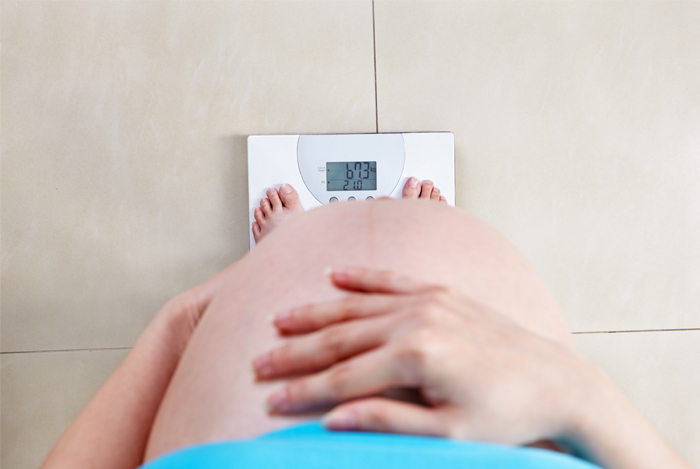
It’s a given – your body will gain weight during your pregnancy. And don’t worry about it too much, because it’s proof that your body is supporting your growing baby. But you may still have questions about your weight gain, so here are the answers.
Many women enter pregnancy overweight, gain too much weight during their pregnancy, and then don’t lose the weight after the baby is born. This pattern contributes heavily to the obesity epidemic in the United States.
Generally, an average-weight woman should gain around 25 pounds and no more than 35 pounds during pregnancy. Women who are overweight when entering pregnancy – who have more than 25 percent fat tissue for body weight – should gain no more than 15 to 25 pounds. Underweight women should gain 28 to 40 pounds, depending on their height.
It’s not total weight gain that’s the most important during your pregnancy, it’s the pattern of weight gain. You should start slow in the first trimester, and then steadily increase in weight gain during the last two trimesters. If you have sudden changes in weight, you should discuss it with your OBGYN.
Like with any lifestyle overhaul, staying healthy during your pregnancy may prove a little challenging at first. But if you follow these tips, you’ll do everything in your power to ensure you deliver a strong, healthy child.
Congratulations in advance!
What advice do you have for pregnant mothers who are trying to stay as healthy as possible? Share in the comments below.
The post The 8 Most Important Nutrition Tips for Your Pregnancy appeared first on Nutrition Secrets.
http://www.nutritionsecrets.com/the-8-most-important-nutrition-tips-for-your-pregnancy/
No comments:
Post a Comment